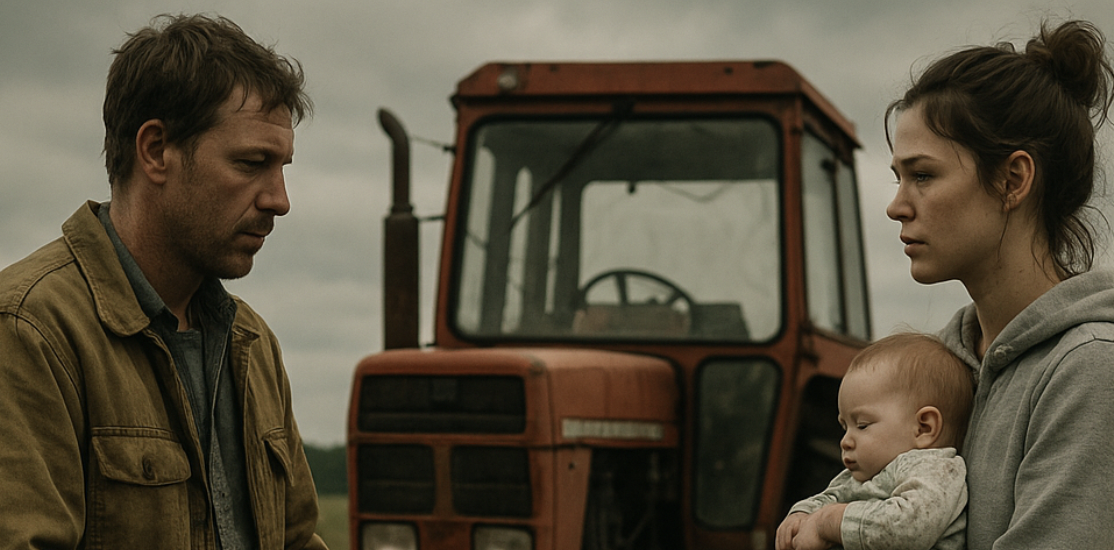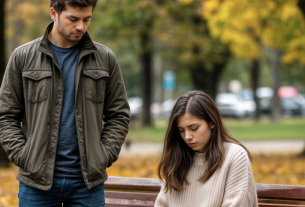Semyon stood at the window as if his boots had grown roots. His heart stalled; breath snagged in his throat. Beyond the glass, evening had thinned the sky to a bruised blue, and inside the house a lamp glowed—not the crisp white of a bulb, but a gentle, uncanny radiance, like the light from a long-forgotten holiday table still burning after everyone had gone.
That wasn’t what held him, though. In the half-dark at the window stood a woman. Her dress looked old-fashioned even for the village—long and dark, with embroidery along the hem rubbed pale by years. Her face was wan, almost translucent, and in her arms she cradled a child whose small body flickered faintly, like a candle barely holding its flame.
Then she turned. And looked straight at him.
Her gaze held sorrow, yes, but not only sorrow. Beneath it lay something else—less fear than a question. Ancient. Out of step with the hour. Out of step with this time at all.
He lunged for the door, knees suddenly loose, heart hammering as if it wanted out. The key bit his fingers with winter cold; still, he forced it to turn. The door swung inward without resistance—too easily for a house that should have had strangers inside.
Silence.
Everything was as it always was—the resin-sweet smell of timber, the friendly heat from the stove, floorboards that announced each step. And yet nothing was the same. It felt like stepping into someone else’s memory, borrowing a life that wasn’t his.
A letter lay on the table.
The paper was brittle and sun-faded, edges chewed by time. Semyon lifted it carefully, unwilling to bruise its quiet. The handwriting was neat, the loops round and unmistakably feminine:
“Please, if someone finds this letter… I don’t know where to go with the child. We have been driven out. We no longer knock. If trouble happens — let at least someone remember us. Masha and her little son Vanechka.”
The date in the corner: June 8, 1956.
Semyon’s fingers tightened. Gooseflesh shivered across his arms. This wasn’t a prank. This wasn’t coincidence.
He turned. By the stove, on the floor, lay a doll—porcelain, one arm cracked, hair snarled by decades. He was certain it hadn’t been there. Not this morning. Not yesterday. Not last year.
He stumbled out onto the porch. The air had thickened; the sky pressed low and gray-blue, as if a storm were thinking it over. The road lay empty—no footprints, no voices, not the faintest trace of anyone’s passing. Dry leaves scuffled in the wind. Far off, something creaked—old wood, or the memory of it.
Morning arrived wrapped in fog. Dense, clinging, as though the earth itself wanted to hide. Semyon lingered, but his thoughts pecked and fluttered, restless. He had to tell someone—if only to quiet his own mind.
On the path to the local policeman, his thoughts rattled like trapped birds. He saw the morning woman again—alive, real—the warm weight of keys changing hands, her breath fogging in the cold, the tired voice speaking of homelessness, of needing “just a little rest.” And the baby—laughing. Laughing up at Semyon, as if he knew him.
“You’ve gone soft in the head, brother,” the policeman said after hearing him out. “Who put that woman in front of you?”
No one believed him. Most waved him off. Only old Marfa crossed herself and whispered, “So you saw them… Masha, the orphan who froze here. Seventy years gone. She asked for shelter, and folks—hard as millstones. They froze that same night.”
Semyon said nothing. He didn’t want ghosts. He didn’t want to hang his life on superstition. But he couldn’t jam last night into a box labeled nonsense.
And yet—he remembered—the woman that morning had been living flesh. He had felt her breath, seen her smile, heard a child’s laughter. A thought dawned, slow and stubborn: perhaps it hadn’t been Masha at the window. Perhaps it had been a warning arrival from elsewhere. Perhaps Masha hadn’t come for herself at all—but for others. To insist that you do not turn away from those who ask for help.
He decided then that his house would stay open. Not just a house, but a threshold—the kind you cross when you have nowhere else to go. He left the doll where it was, on the windowsill beside the flowers. Some evenings a peculiar shine would kindle in its glass eyes, as if something were watching.
Months passed. One following another. Time moved on, but the feeling of company never left. Now and then Semyon woke at night to a thin laughter, a whisper of movement behind the wall. When he rose, the rooms were empty and ordinary.
Early spring brought a soft knock. Timid. Careful. As if not to disturb.
Semyon didn’t hesitate. He opened the door at once.
A woman stood there with a baby in her arms—chilled, hollowed by fatigue, but alive.
“Come in,” he said. “There’s always a corner here for those in need.”
She stepped over the threshold, and for a heartbeat he saw something familiar in her eyes—not a face he knew, but an expression: gratitude, relief, and the tiniest flare of light.
Her name was Olya—quiet, gentle. Her son, Vanya, was a curious, sunny creature, forever wrapping a small fist around Semyon’s finger and laughing as if they’d always belonged to each other.
The name itself—Vanya—made Semyon start every time. Coincidence? Maybe. But after the letter, he no longer swore by coincidence.
One evening the electricity died. Olya asked for a candle. She set it on the table, sat beside the warm pool of light, and whispered, “I don’t know why my feet brought me here of all places… but it felt as if someone were waiting. As if the house itself whispered: ‘Come…’”
Semyon glanced at the doll. In that moment—though he knew it couldn’t be—its eyes seemed to glisten. The candle flame trembled as if breathed upon, gently, by an unseen mouth.
Later, rummaging in the attic, he found an old chest and, inside it, a photograph—black-and-white, edges curled like dry leaves. A young woman with dark hair, a boy of about five with kind eyes.
The caption read:
“Maria and Vanechka. 1955.”
He brought it to Olya. Color fled her face. Her hands shook.
“I had one just like this at home…” she murmured. “Mama said they were my great-grandmother and great-uncle, who died under strange circumstances. Only no one ever said where…”
Warmth moved through the rooms then, like the house exhaling. Something was finishing. A circle tying its ends.
Olya stayed. Not all at once, but little by little the house took her in. Semyon didn’t press. He offered space and quiet and—most of all—trust.
He found himself home more, the farm less. Sometimes they brewed strong tea, watched the sun sink behind the birches, or sat wordless, listening to wind sing in the chimney.
One spring morning, the doll was gone. Not fallen. Not borrowed. Gone. He searched everywhere and found nothing.
That evening, tucked beneath the windowsill, he discovered a fresh sheet of paper. The handwriting was the same—rounded, woman-tired, unmistakable.
Thank you. We are home.
Through a blur of tears, Semyon smiled. He couldn’t begin to explain it. He didn’t need to. He knew Masha and Vanechka had finally come to rest. And he understood that he’d been given a beginning of his own—no longer alone, but with a family he and the house had made between them, in spite of time, fate, and old ghosts.
Epilogue
From then on, Semyon kept a door that never locked, a table where the kettle was always near the boil, and a bed warmed by the stove. He knew that whoever crossed that threshold would find more than shelter—would find a piece of themselves. Perhaps even a hand held out from the past.
Sometimes, on quiet evenings, when the wind worried the curtains and the candle guttered to a stub, the house answered with children’s laughter—soft and kind—as if someone were laughing from the very heart of time.



